2-19-10
Social Issues through Women’s Eyes in Iranian Cinema: Arefpour and Bani-Etemad Talk about Heiran and Gilaneh
By Diane Sippl
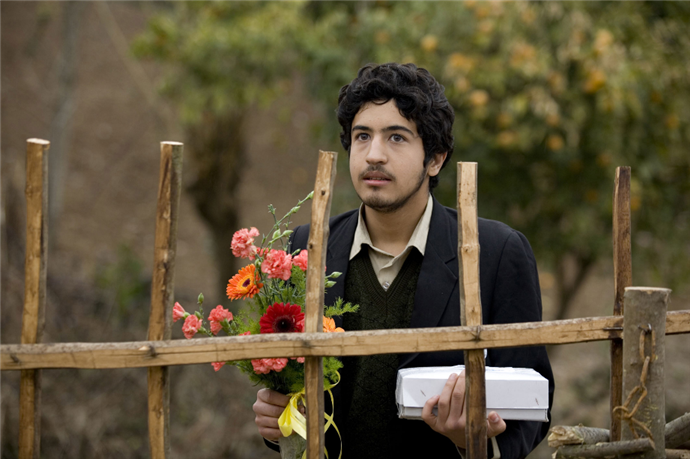
Heiran by Shalizeh Arefpour
Shalizeh Arefpour’s sumptuous and sobering debut feature, Heiran, headed off the “20th Annual Celebration of Iranian Cinema” (February 5-20, 2010, screening eight narrative features and four documentaries) by the UCLA Film and Television Archive, which continually offers one of the oldest Iranian film festivals in the United States. Iran’s world-renowned filmmakers are lauded for the poetic beauty of their storytelling along with their astute social critique, and they continue to garner awards at the most prestigious of international competitions for their innovation as well. UCLA has not only showcased the artistic expression of these filmmakers, but has also brought the directors, producers, and actors to Los Angeles to discuss with audiences the process of their work. To this effect Americans have gained a cultural education of Iran and even its neighbors in the region from another point of view, since over the years a number of the films have addressed issues concerning Kurdish ethnicity, war with Iraq, and Afghani immigration.
Three such films are discussed here, including Heiran and My Little Country and also Gilaneh. Shalizeh Arefpour accompanied the presentation of Heiran, which was followed by a Q & A with Archive programmer Shannon Kelley, and Rakhshan Bani-Etemad attended when her Gilaneh was shown at another event, “Up Close and Personal: Iranian Artists in their Own Words” (October 8-17, 2009, screening seven features and one short), hosted by the Archive at UCLA’s James Bridges Theater and by the Academy of Motion Picture Arts and Sciences at the Academy’s Linwood Dunn Theater in Hollywood. This delegation of eleven artists was the first from Iran to Los Angeles in an exchange program initiated by the Archive that began with Vietnamese filmmakers, and it was the first time that the reciprocated visits were also supported by the Academy. Alfre Woodard, one of the cinema artists on the American team who visited Teheran’s cinema studios on the Iranian end of the exchange, interviewed Bani-Etemad at the Los Angeles event. With a long career behind her in Iranian documentary and narrative filmmaking, the prolific Rakhshan Bani-Etemad (Off Limits, Nargess, The Blue-Veiled, Under the Skin of the City, Our Times, Mainline) also produced Sarefpour’s Heiran.
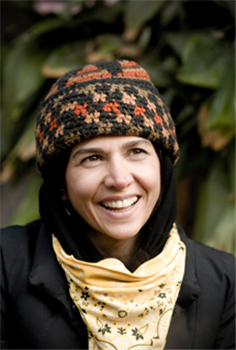
Shalizeh Arefpour
In Heiran, Shalizeh Arefpour’s incredibly strong first feature, when the teenage Mahi falls head-over-heels for a boy she meets on the bus, she doesn’t appear to be making the usual mistakes. Heiran is not only nice-looking but respectful, diligent, and trustworthy — downright “noble” for all intents and purposes, but not from the perspective of Mahi’s father, who sizes up his social position and trajectory in a flash. As an Afghani refugee, he looks like nothing but trouble. In Iran on a student visa, he will not be allowed to work there, so how will he find a way to take care of Mahi? As in many immigrant epics, love looms larger than the law, and the couple finds a way to move, marry, and start a family, until….
Since the reign of the Taliban, more than three million Afghanis have fled to Iran as illegal immigrants, and the Iranian government still has not managed to integrate them into the society. Previously a documentary filmmaker, Arefpour here looks very realistically at the social issues her characters face all the while she sustains their utterly romantic and endlessly hopeful point of view. Meanwhile, autumn gathers itself in the hills of northern Iran, and the lush music gives way to a desolate borderland.
In Rakhshan Bani-Etemad's Gilaneh,
the depiction of everyday life in a region of war is so palpable, it would seem
impossible to uphold acts of aggression under any circumstances. And we see a variety of them, ingeniously depicted in a cross-flow of opposing directions and conflicting
motivations.
In 1988, on the Iranian New Year’s Eve, the nation’s capital celebrates, only to be hit with catastrophic bombing from Iraq. Meanwhile Gilaneh, a peasant widow from the green countryside near the Caspian Sea, watches her handsome son, engaged to be married, walk out the door headed straight for battle. When her pregnant daughter is compelled to make the journey to Teheran to search for her husband, now a deserter from the army, she and Gilaneh find everyone fleeing for their lives.
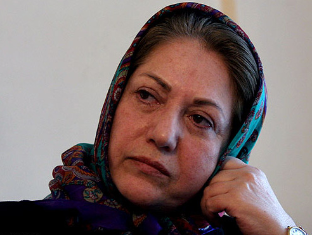
Rakhshan Bani-Etemad
That was Iraq’s war on Iran. Fifteen years later we see America’s war on Iraq. Gilaneh now carries her son on her back from his bed to the sunlight outside. He is a deranged invalid due to the assault of chemical weapons. His one-time fiancée finally visits with her children from another marriage. The doctor can rarely come, and there is little to eat, nor is there the strength for growing crops, but the prematurely aged Gilaneh carries on, hoping for a war widow who might join her son in their desolate home. A small TV shows the U.S. pelting Baghdad — and also anti-war demonstrations around the world. Why is it that neither is a comfort?
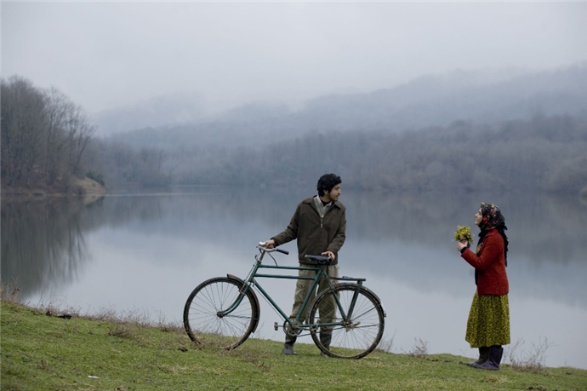
Heiran
When asked about the source of the story for Heiran, Arefpour replied, “Unfortunately my character, Mahi, is just one example of many thousands of women, and these kinds of scenarios occurred often after the fall of the Taliban, when the Iranian government passed a law saying that all Afghani residents had to return to Afghanistan. It really separated a lot of families, and my film is not atypical of Iranian women who fall in love with and marry Afghani men.”
Continuing, she explained, “The idea really came from actually witnessing a lot of brick-making factories outside of Teheran that tend to employ exclusively Afghani labor because it’s very difficult work, and really dangerous. I witnessed, literally, the squalor in which they are living, often families with eight or nine children all living in the same room, and many times just the children, since migrant workers don’t always get back to the living quarters, because they can’t; the men often get deported. None of the children I saw were actually given birth certificates or any kind of papers that would identify them to the State, so as a result, none of them got admitted to the schools.”
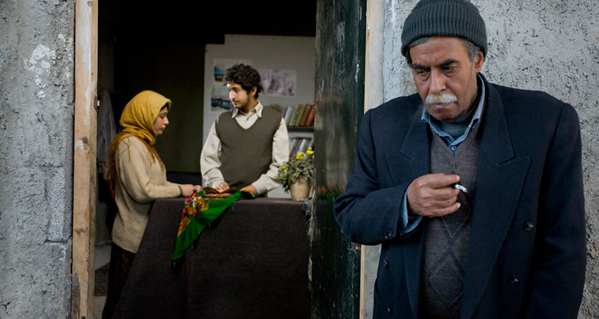
Heiran
Commenting on her screenwriting partner, Arefpour said, “Naghmeh Samini wrote a short play with that main theme, an Afghani husband who disappeared one day and did not return; he was taken away. Because there was this commonality in themes that we were both working on, in time we got introduced to each other it was just natural that we collaborated.”
Heiran unfolds with the fate of a classical tragedy. Mahi and Heiran hold pure joy in their hearts despite the clear parental prediction of the doom that lies ahead of them. As Mahi’s grandfather sighs, “Since when have lovers had a mind to listen to others?”
Arefpour added, “With respect to all the sadness that this movie entails, in reality this film is quite temperate. If you were to truly see all the suffering that Afghanis actually go through, in the audience you would be quite exhausted emotionally, more than now. I think one of the key points is the back-story of the grandfather: here’s a man who has experienced true love in his life. He understands what lovers go through.”
It’s quite moving the way the grandfather passes the days confiding to his deceased wife yet at the same time faces the harsh reality by following Mahi to Teheran, ever so protectively.
“My film is dedicated to Khosro Shakibaei, who plays the grandfather. When we were shooting, in production, he was already quite ill, but he still came to the set every day. Within a few months of when we completed production, he passed away. He did such a great job, that I thought at least I could dedicate the movie to him.”
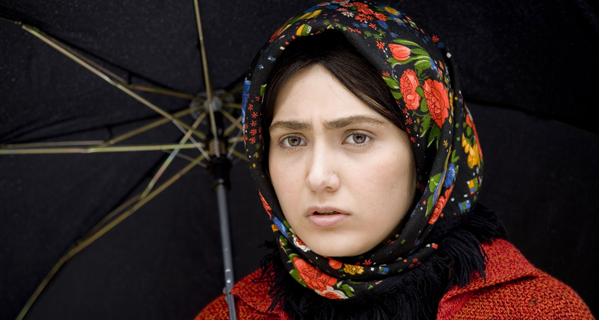
Heiran
“I had known Baran Kosari, who plays Mahi, since I was a child, and when we wrote the script, it was with Baran in mind as the main character. Finally, Bani-Etemad pushed this choice for us.”
When asked about location shooting, Arefpour commented, “Most of the scenes you see happen in northern Iran, and what’s so difficult about finding a place to film there is that it’s becoming so developed, you lose the more traditional authenticity because these places become modern very quickly. So that was one of the challenges. As for the border scenes, they were actually shot quite close to the Afghan border, so that’s probably why they feel authentic.”
“Even though the family that we originally see in the film is living in northern Iran, they are actually refugees from the war. You know that if you’re Iranian, from the accent and what they say. Actually, they’re from a region called Khūzestān in Iran, which is right on the border with Iraq; the people there in the Iran-Iraq war got displaced and had to run away to northern Iran. And that’s the film’s perspective.”
“When Mahi’s father says, ‘I don’t want what happened to my mother to happen to my daughter’, it’s precisely that, because his mother was a casualty of war. So try to understand that one of the main themes here is the humanity of every individual. On the border, you see that the guards are quite humane. They could be a lot meaner. With every individual, whether it’s the police officers or the customs officers enforcing the immigration laws, there isn’t a meanness or malice in their actions. There is humanity. It’s the laws and the legal system that force the policies upon everyone.”
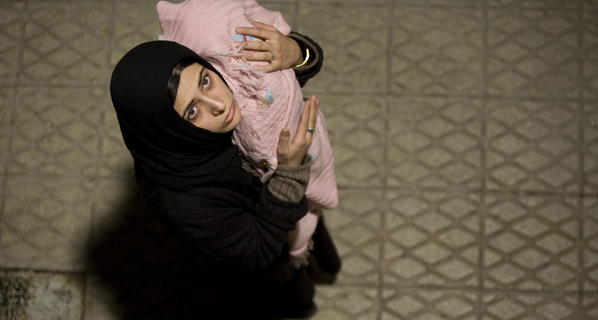
Heiran
“The reason I chose to set my story in northern Iran was to show that the ricochets of war, the unintended consequences of what happens when there’s an armed conflict, often go far further than you realize, so the conflict was in southern Iran, but the ricochets and the results of it fall upon an entirely different region of Iran. When she first sees Heiran, the aunt thinks, ‘He’s an Afghani, so obviously he’s either a murderer or a thief...’ Naturally, the worst things you could think of, she thought of him. But she came around, and that’s very important. She realized that he was just like her, and she accepted him.”
“It takes a lot of effort and
paperwork to actually get to screen a movie in a theater in Iran, but I’m pleased to say that
tomorrow Heiran will play in theaters there. It’s
going to be the inaugural opening of this film, the first time after a whole
year in Iran. It’s been a year-long battle… An organ of the
government decides how it will be shown. One of the reasons this battle was fought was that often they don’t ban
the movie; they just change certain scenes. And that’s what they wanted to do, but the battle was
won. Nothing — no scene — was
touched. They wanted to take the entire
final sequence out because they felt that we have been treating Afghanis as
guests and treating them quite well, and that this scene, which is portrays how Afghanis have actually been treated, is negative, and therefore it
shouldn’t be shown.”
The usual question was raised in the audience: Were there any issues relating to women or sexuality? And Arefpour answered, “In general in Iranian films, you don’t see a female’s hair in any way, shape, or form, whereas Mahi wears very visible braids. Also sometimes you see her grandfather touching her knees, or vice versa, or touching her back or holding hands with her, and often this is a taboo in Iranian cinema.”
Was there any problem for Arefpour? “Oddly enough, not so much that. However, for example, one of the scenes was the wedding night, and on this night you often see a big blanket that’s red. And the redness of our blanket was a huge issue. It was too red, too provocative. Now that’s how difficult it is in Iran to make movies. But it’s worth it. If you can open another window on the society, even for a couple of individuals who will have a better understanding of this issue, then I think all the difficulty is worth it.”
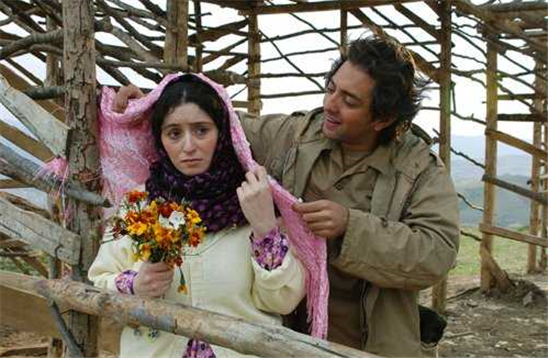
Gilaneh by Rakhshan Bani-Etemad
What is refreshing to see in the film is the attitude the family displays, even and especially the father, toward the growing opportunity for women in education and careers.
“Absolutely. Not only as a woman but primarily as a human being, I think that the position of women, the power of women throughout the world, is progressing with positive movement. As we were writing the character background for the father figure — where he comes from, what he does, what his beliefs are — this was one of his primary convictions: he wants his daughter to get an education. We didn't want to portray every individual who’s in a province or outside of the larger cosmopolitan cities to be a close-minded or narrow-minded person.”
Since there are thousands of women who face the predicament of husbands who are deported, one wonders if there is any kind of political movement or social movement of women who are trying to get their husbands back or help themselves so that they can get some of their financial needs met.
“I can estimate that the majority of the Afghanis who are deported from Iran are back into Iran illegally within a month. There was a sort of smuggling back home of these Afghanis, back into their towns in Iran, and the government gave orders to stop them, but this became exhausting, and now while officially they’re doing their best to stop these Afghanis from moving back in, it’s kind of been given up. Often the Afghani families, especially outside of Iran, face problems. Actually, there are plenty of organizations, NGOs, who have been working very hard to open up schools to educate particularly these types of orphans or Afghani children. There will even be a short film on this subject on Feb. 19th as part of this series.”
“In closing, I can’t say I’m pleased that the theme my film addresses is so universal. Immigrants all over the world, in different cultures, in different ways, suffer these hardships. If Heiran opens a little window to humanity as to what immigrants go through, from their perspective, then I will have achieved something.”
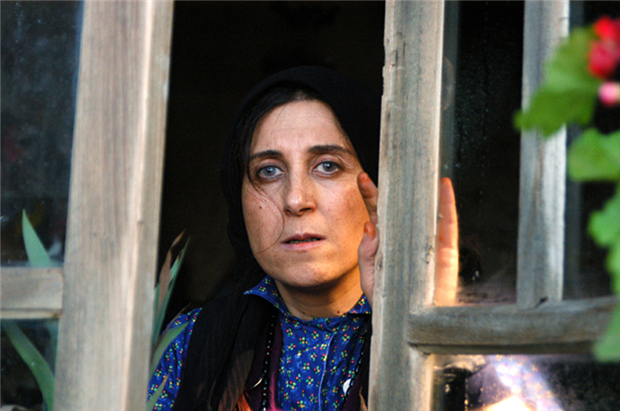
Gilaneh
My Little Country by Abbas Mohammadi takes us to a school for Afghani children who are refugees in Iran. There they are safe and protected, they are taught in several languages, and they can also study their own culture and history. Unfortunately some of them also work at jobs such as sewing garments for a living, going to school only for a short time in the afternoon and laboring all morning and evening, doing homework in the wee hours of the morning. It’s heartbreaking to hear girls practice syllabification by reciting out loud over and over, “Be careful when you leave to go to school.”
Shalizeh Arefpour had served as Assistant Director for four of Rakhshan Bani-Etemad’s film projects. During the last of these, she presented a script she had written to her mentor, Bani-Etemad, who liked it well enough to offer, for the first time ever, to produce it. As Arefpour directed that film, Bani-Etemad helped her, working quite collaboratively. It is one of the regulations of the Ministry of Guidance that first-time filmmakers work with a more established filmmaker as an advisor.
At the Linwood Dunn Theater with the presentation of her own film, Gilaneh, Bani-Etemad told Alfre Woodard about the genesis of her story.
“I started writing Gilaneh in the time when there was talk about the U.S. invading Iraq. For eight years my country burned because of war and I made this film as a tribute to peace. At that time, though I knew the main character was an Iranian and the danger was caused by the Iraqi army, I wanted people to see that war is an evil anywhere. I truly wish we could live in a world in which politicians allowed the conversation to be between art and culture, not war, because this conversation is the shortest path between two nations.”
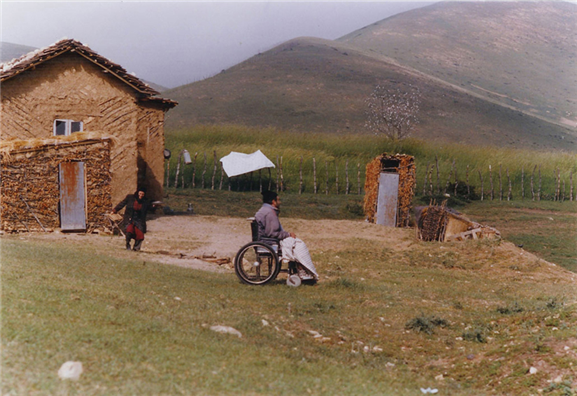
Gilaneh
Bani-Etemad’s daughter, also a stage actress, plays the role of Goubeh in Gilaneh. The film is dedicated to the actress Fatemeh Motamed-Arya, “my personal Gilaneh,” Bani-Etemad stated. Asked to comment on the fact that Fatemeh Motamad-Arya was not allowed to join her on this visit as planned, Bani-Ete-mad replied, “She is among the most professional of all those with whom I have ever worked. In the airport her passport was taken away. Until today, we’re not sure of the reason. If you met her in person and saw how different she is in real life from her role in the film, you’d see what a really great actress she is. At festivals the moderators recognize her.”
“You’re a mother,” Alfre Woodard observed. “How has gender affected your filmmaking?”
“My overall comment is that as a woman you face many hurdles. Mine aren’t particularly different. The problems are money — finding funds — and also the number of theaters in which to release the film. I’ve been around long enough so that gender is the least of my worries. Having said that, there are certain professions with power where it is frowned upon for women to enter. Yet today the power of the confidence of young women is far larger than that of any intimidation. As for me, I mistook modesty for shyness, and I found very much strength under the chador!”
“I consider it an honor to have been co-directing with Mohsen Abdolvahab (on every one of her films since Nargess). In the process, our thinking has become so synched with each other’s, I’d love to do it again.”
Regarding the future of Iranian cinema, Bani-Etemad stated, “I believe the new generation of filmmakers in Iran — the New Wave — has a very fresh way of seeing things. Though they have lots of cache from the last generation, they’re also very strong.”
And regarding her country: “My people deserve their freedom, and I hope the freedom movement doesn’t get petty and political but stays on track and stays green.”
Heiran
Director: Shalizeh Arefpour; Producers: Rakhshan Bani-Etemad, Jahangir Kosari; Screenplay: Shalizeh Arefpour, Naghmeh Samini; Cinematographer: Hossein Jafarian; Editor: Sepideh Abdolvahab; Production/Costume Designer: Amir Esbati; Music: Alireza Kohan Deyri; Sound: Sasan Nakhaei.
Cast: Baran Kosari, Mehrdad Sedighian, Khosro Shakibaei, Farhad Aslani, Zhahleh Sameti, Fouzhan Arefpour, Mohsen Mokari.
Color, 35mm, 88 minutes. In Farsi with English subtitles.
Gilaneh
Director: Rakhshan Bani-Etemad, Mohsen Abdolvahab; Producers: Saeed Sa’di, Jahangir Kosari; Screenplay: Rakhshan Bani-Etemad, Mohsen Abdolvahab, Farid Mostafavi; Cinematographer: Morteza Poursamadi; Editor: Davoud Yusefian; Production/Costume Designer: Zhila Mehrjui; Music: Mohammad Reza Aligholi; Sound: Mohammad Reza Delpak, Amir-Hossein Ghasemi, Yadollah Najafi.
Cast: Fatemeh Motamed-Arya, Bahram Radan, Baran Kosari, Jaleh Sameti, Shahrokh Foroutanian, Madjid Bahrami.
Color, 35mm, 84 minutes. In Farsi with English subtitles.